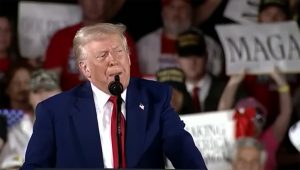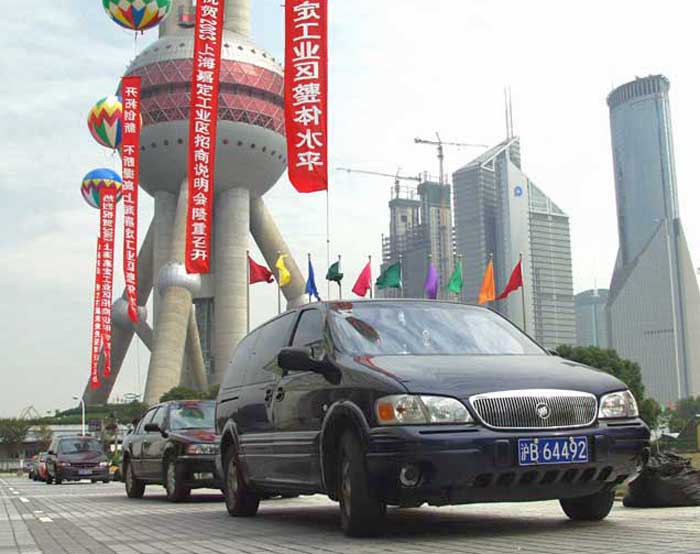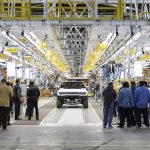As trade friction grows, General Motors wants its suppliers to stop sourcing parts and raw materials from China by 2027, according to a new report, though meeting that deadline could be challenging considering the way the global network has been set up over the last few decades. More from Headlight.News.
A dispute between China and Dutch-based semiconductor company threatened to throw the automotive world into chaos, the Beijing government briefly restricting shipment of chips made in that country.
That’s just the latest sign of trade troubles that have led U.S. auto giant General Motors to issue a directive to thousands of its suppliers ordering them to begin eliminating Chinese-made parts and raw materials, according to a Reuters report quoting “four people familiar with the matter.”
The automaker wants the transition to be completed by late 2027, though it remains to be seen if those suppliers can find suitable short-term alternative sources considering it has taken decades to set up the current sourcing network.
Increasing trade pressures

Under Pres. Donald Trump – shown here in Detroit last April – relations with China have soured, leading to disruptions in supply chains.
According to several sources who spoke to Headlight.News, GM first began looking to shift sourcing away from China more in late 2024. That directive has become more urgent since then due to a variety of factors, including the Trump administration’s push to shift manufacturing back to the United States. In turn, China has begun “using the leverage they have,” said Sam Abuelsamid, principal auto analyst with Telemetry Research.
That has become increasingly apparent in recent months as the Chinese government has placed restrictions on the export of critical raw materials, especially rare earth minerals needed for electric vehicles. The Nexperia dispute is the latest example, with a dispute between China and the Netherlands threatening to disrupt shipments of Chinese-made chips used globally by the auto industry and other sectors.
Just the tariffs put in place on Chinese-made goods by th Trump administration are enough to get automakers like GM rethinking sourcing strategies, said Abuelsamid, “considering any cost benefits from operating in China are now gone and it’s become cheaper to operate elsewhere.”
A long-term relationship

Until recently, GM was one of the two largest automakers in China. It’s been losing momentum to domestic brands like BYD and Geely.
Weaning itself off of Chinese supplies won’t be easy for General Motors. The company has had a long-term relationship with the populous Asian nation, opening its first assembly plant in Shanghai in 1998 and, in the decades since building up a vast network of vehicle and component plants across that country.
At its peak, a decade ago, GM battled it out with Volkswagen for bragging rights as China’s largest automotive manufacturer. But, like other foreign competitors, GM has seen its share of the huge Chinese market tumble over the last couple years as upstart domestic brands like BYD and Geely gain traction.
Meanwhile, they’ve found themselves caught up in increasingly tense global geopolitics that have led to uncertainty and, in some cases, the disruption of supply networks.
More Auto News
- GM Posts $100M Loss in China
- GM Reports Third-Quarter Profit Despite EV Slowdown
- Ford, GM Caught in the Middle as U.S.-China Trade War Heats Up
Seeking “resiliency”

The disruption in supplies of Nexperia chips has added urgency to the search for non-Chinese suppliers.
“We have been working now for a few years to have supply chain resiliency,” GM Chairman and CEO Mary Barra said during the automaker third-quarter conference call in October. Like other automotive manufacturers, Barra said the company is now focusing on localizing parts procurement, preferring to source goods where it assembles its vehicles.
That was echoed by Shilpan Amin, GM’s global purchasing chief, noted Reuters, who said during an October industry conference that recent disruptions have only increased the automaker’s sense of urgency. “Resiliency is important — making sure you have more control over your supply chain, and you know exactly what is coming where,” he said.
That said, several sources, speaking on background, cautioned Headlight.News that building resiliency isn’t a simple task.
Challenges ahead
“Everyone wants to reduce their dependency on China,” said Abulsamid, the only source willing to talk on the record about GM’s directive. But it won’t be a short-term fix, he stressed.
“it’s a process that takes a lot of time as suppliers ask where are their alternatives,” Abuelsamid said. “If they don’t already have capacity elsewhere,” he added, it could take “months and even years” to set up alternative sourcing strategies that might involve building new plants. That’s all the more difficult at a time when there’s growing concern about the global economy and suppliers are facing more financial pressures limiting their ability to open new factories.
“In some cases, (the dependence upon China) has been 20 or 30 years in the making,” Collin Shaw, head of MEMA, the Vehicle Suppliers Association, told Reuters. “We are trying to undo it in a few years,” he added, cautioning, “It’s not going to happen that fast.”






0 Comments